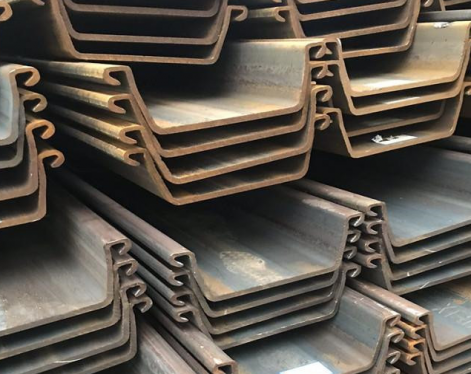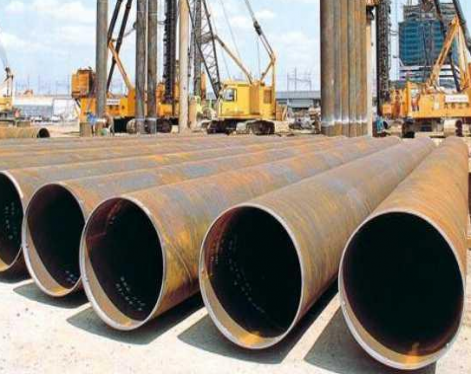The strength of steel sheet piles is generally divided into Q235 and Q345 grades, of which the tensile strength of Q235 is 235MPa and the tensile strength of Q345 is 345MPa; while the strength of pipe piles varies according to the concrete strength grade and wall thickness, such as the concrete strength grade of prestressed high-strength concrete pipe piles (PHC) is not less than C80. Therefore, the specific strength comparison needs to be determined according to the specific model and specification selected, and it cannot be generalized.
Strength characteristics of steel sheet piles:
Steel sheet piles are formed by shearing and bending steel plates and connected by high-strength bolts. Its strength grades are mainly divided into Q235 and Q345. Q235 is ordinary carbon structural steel with a tensile strength of 235MPa and a yield strength of 375MPa; while Q345 is a low-alloy high-strength structural steel with a higher tensile strength of 345MPa and a yield strength of 470MPa. These strength indicators make the steel sheet piles have high stability and safety when bearing loads.

Strength of foundation pit steel sheet piles:
The foundation pit steel sheet piles are composed of a series of spliced sheet piles (spliced together into a whole), and their materials are high-strength steel, which has the advantages of high strength and good rigidity. The main design parameters of steel sheet piles include groove width, groove depth, plate thickness, etc., while the strength is related to the plate thickness and the cross-sectional area of the groove. It has the advantages of being heavy, durable, and rigid. It can withstand water pressure during construction and effectively control the water flow and soil in the foundation pit. Since the sheet pile itself is a high-strength material, it can meet some higher requirements for front support. In addition, in the case of a large cantilever depth, the sheet pile can provide more bending resistance to meet construction requirements.
Strength characteristics of pipe piles:
The strength characteristics of pipe piles mainly depend on their concrete strength grade and wall thickness. The concrete strength grade of prestressed high-strength concrete pipe piles (PHC) is not less than C80, showing extremely high compressive resistance. At the same time, the wall thickness of the pipe pile is also an important factor affecting its strength. Generally speaking, the wall thickness of PHC and PC piles is between 75mm and 130mm, and the wall thickness of large-diameter piles can even reach 150mm, which provides good bending resistance and bearing capacity for the pipe piles.
Strength of foundation pit steel pipe piles:
Foundation pit steel pipe piles are hollow piles of vertical pipe type, which have the advantages of light weight and convenient construction. Its main design parameters include pipe diameter, wall thickness, etc., while strength is related to pipe diameter and wall thickness. Steel pipe piles can withstand axial and lateral forces at the same time, and their bending resistance is slightly weak, so they are more suitable for use in areas with shallow overhang depth. At the same time, as the vertical pipe of steel pipe piles, they are subject to bending and shear forces, so they need to be strengthened at the top.

Strength comparison in actual application:
In actual construction, the strength performance of steel sheet piles and pipe piles varies depending on the specific application scenario. Steel sheet piles are particularly suitable for use in foundation projects with shallow excavation depths, such as narrow sites, high groundwater levels, and soft soil layers, because of their relatively short length and convenient construction. Pipe piles are often used in projects with high requirements for compression and shear resistance, such as bridges, highways, and docks, because of their excellent compressive resistance and large bearing capacity.
In general, the strength of steel sheet piles is slightly higher than that of steel pipe piles. However, the specific type of foundation pit support to be selected requires comprehensive consideration of specific engineering conditions, such as foundation pit depth, surrounding environment, groundwater and soil conditions, construction conditions, and cost. In terms of strength alone, steel sheet piles are better than steel pipe piles.
Strength characteristics of steel sheet piles:
Steel sheet piles are formed by shearing and bending steel plates and connected by high-strength bolts. Its strength grades are mainly divided into Q235 and Q345. Q235 is ordinary carbon structural steel with a tensile strength of 235MPa and a yield strength of 375MPa; while Q345 is a low-alloy high-strength structural steel with a higher tensile strength of 345MPa and a yield strength of 470MPa. These strength indicators make the steel sheet piles have high stability and safety when bearing loads.

Strength of foundation pit steel sheet piles:
The foundation pit steel sheet piles are composed of a series of spliced sheet piles (spliced together into a whole), and their materials are high-strength steel, which has the advantages of high strength and good rigidity. The main design parameters of steel sheet piles include groove width, groove depth, plate thickness, etc., while the strength is related to the plate thickness and the cross-sectional area of the groove. It has the advantages of being heavy, durable, and rigid. It can withstand water pressure during construction and effectively control the water flow and soil in the foundation pit. Since the sheet pile itself is a high-strength material, it can meet some higher requirements for front support. In addition, in the case of a large cantilever depth, the sheet pile can provide more bending resistance to meet construction requirements.
Strength characteristics of pipe piles:
The strength characteristics of pipe piles mainly depend on their concrete strength grade and wall thickness. The concrete strength grade of prestressed high-strength concrete pipe piles (PHC) is not less than C80, showing extremely high compressive resistance. At the same time, the wall thickness of the pipe pile is also an important factor affecting its strength. Generally speaking, the wall thickness of PHC and PC piles is between 75mm and 130mm, and the wall thickness of large-diameter piles can even reach 150mm, which provides good bending resistance and bearing capacity for the pipe piles.
Strength of foundation pit steel pipe piles:
Foundation pit steel pipe piles are hollow piles of vertical pipe type, which have the advantages of light weight and convenient construction. Its main design parameters include pipe diameter, wall thickness, etc., while strength is related to pipe diameter and wall thickness. Steel pipe piles can withstand axial and lateral forces at the same time, and their bending resistance is slightly weak, so they are more suitable for use in areas with shallow overhang depth. At the same time, as the vertical pipe of steel pipe piles, they are subject to bending and shear forces, so they need to be strengthened at the top.

Strength comparison in actual application:
In actual construction, the strength performance of steel sheet piles and pipe piles varies depending on the specific application scenario. Steel sheet piles are particularly suitable for use in foundation projects with shallow excavation depths, such as narrow sites, high groundwater levels, and soft soil layers, because of their relatively short length and convenient construction. Pipe piles are often used in projects with high requirements for compression and shear resistance, such as bridges, highways, and docks, because of their excellent compressive resistance and large bearing capacity.
In general, the strength of steel sheet piles is slightly higher than that of steel pipe piles. However, the specific type of foundation pit support to be selected requires comprehensive consideration of specific engineering conditions, such as foundation pit depth, surrounding environment, groundwater and soil conditions, construction conditions, and cost. In terms of strength alone, steel sheet piles are better than steel pipe piles.









